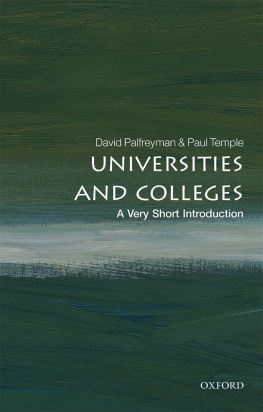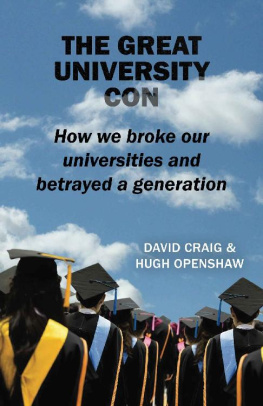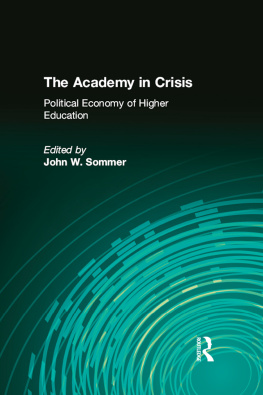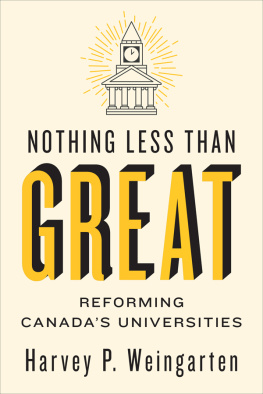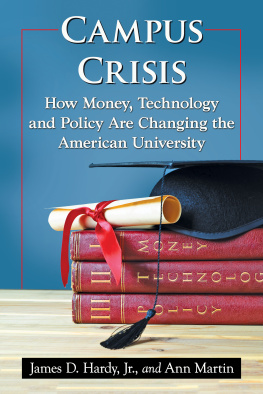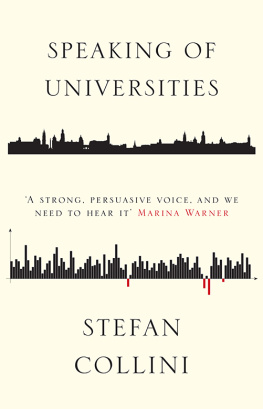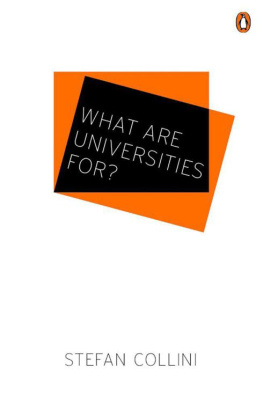Copyright
Copyright Ken S. Coates and Bill Morrison, 2016
All rights reserved. No part of this publication may be reproduced, stored in a retrieval system, or transmitted in any form or by any means, electronic or mechanical, photocopying, recording, or otherwise (except for brief passages for purposes of review) without the prior permission of TAP Books Inc. Permission to photocopy should be requested from Access Copyright.
Editor: Diane Young
Design: Laura Boyle
Epub Design: Carmen Giraudy
Cover Design: Sarah Beaudin
Cover Image WestLight/iStockphoto.com
Library and Archives Canada Cataloguing in Publication
Coates, Kenneth, 1956-, author
Dream factories : why universities won't solve the youth jobs crisis / Ken S. Coates and Bill Morrison.
Includes bibliographical references.Issued in print and electronic formats.
ISBN 978-1-4597-3377-0 (paperback).--ISBN 978-1-4597-3378-7 (pdf).--ISBN 978-1-4597-3379-4 (epub)
1. College graduates--Employment. 2. Youth--Employment. 3. Education, Higher--Social aspects. 4. Universities and colleges.I. Morrison, William R. (William Robert), 1942-, author II. Title.
HD6277.C62 2016 331.11'445 C2016-900383-3
C2016-900384-1
We acknowledge the support of the Canada Council for the Arts and the Ontario Arts Council for our publishing program. We also acknowledge the financial support of the Government of Canada through the Canada Book Fund and Livres Canada Books, and the Government of Ontario through the Ontario Book Publishing Tax Credit and the Ontario Media Development Corporation.
Care has been taken to trace the ownership of copyright material used in this book. The author and the publisher welcome any information enabling them to rectify any references or credits in subsequent editions.
J. Kirk Howard, President
The publisher is not responsible for websites or their content unless they are owned by the publisher.
Visit us at: Dundurn.com | @dundurnpress | Facebook.com/dundurnpress | Pinterest.com/dundurnpress
Note that the words university and college are used interchangeably in this book to refer to degree-granting institutions of higher learning.
Preface
During the first 2015 Democratic presidential debate, Senators Hillary Clinton and Bernie Sanders struggled to outdo each other with grandiose visions for free public university and greatly enhanced loans and bursaries for students from poor families. On October 21, 2015, Joe Biden, vice-president of the United States, outlined his devotion to college education, while announcing his decision not to run for the presidency. North of the border, Justin Trudeau, during his successful campaign to become prime minister of Canada, extolled the virtues of expanding access to universities. If there is consensus about anything in North America, it is that a college or university education is a good thing for contemporary youth.
Indeed, heading off to college is one of North Americas signature rites of passage. Everyone knows the routine: evaluating colleges, cramming to get the high-school grades necessary to get into the best universities, waiting for the admission (or rejection) letters, tearful farewells for those leaving, and move-in day at the college residence. And then the studying begins.
What happens after that is also well known: four or five years of college (with the bright ones staying on for graduate school or a professional degree), the stress of job applications, the choice of employer, and settling into a career. Traditionally, the career-work continuum is followed by marriage, house purchase, and children.
This new American Dream is founded on a firm belief in the efficacy of a Learning = Earning formula where the number of years of post-secondary study provide an assurance of an ever-higher income. It appears to be a worthy successor to the dreams of earlier generations who built their futures and fortunes on agriculture, industrial labour, entrepreneurship, or the combination of unionized and government work that propelled prosperity in the postWorld War II era.
But what if this belief is not true? What if the formula is wrong? What if the actual experience of North American students deviates dramatically from the image that has sustained the optimism and dreams of young people for the past three generations? For those who have saved for years to pay for a college education, who have pinned their hopes on the career potential of a university degree, the formula is intensely personal. What if Learning does not equal Earning ?
Rumblings are getting louder that all is not well in college-land. Sociologists Richard Arum and Josipa Roksa have provided an invaluable service to the research-based understanding of contemporary post-secondary education in their provocative studies of the actual experiences of American college students. Their first book on this theme, Academically Adrift: Limited Learning on College Campuses , examined how much students actually took away, intellectually, from the college experience. Their depressing study argued that most students showed surprisingly little gain, even after they had completed their degrees.
In Aspiring Adults Adrift: Tentative Transitions of College Graduates, Arum and Roksa looked at the employment experiences of a group of university students who graduated in 2009, a time of serious economic difficulty in America. The book observed that college graduates did much better than those without a college education, but also documented the severe challenges facing young adults. The researchers found that for those unemployed at the time of the spring 2011 survey, 40 percent had been unemployed for six months or more. Almost a quarter of the respondents who were unemployed in 2011 had also been unemployed when surveyed in the spring of 2010. Others were underemployed, with 4 percent working fewer than twenty hours per week. The remaining 89 percent of graduates had found either full-time employment or close to it, but many were in low-paid jobs. Fifteen percent of college graduates were in full-time positions that paid less than $20,000 per year, and 15 percent were in positions that paid between $20,000 and $30,000 per year. Considered as a whole, 53 percent of the college graduates who had not re-enrolled full-time in school were unemployed, employed part-time, or employed in full-time jobs that paid less than $30,000 annually.
College and university has never been one thing or a single kind of institution. In his excellent and affectionate commentary on the American college, called simply College , Andrew Delbanco, a Columbia University professor, observed:
For a relatively few students, college remains the sort of place that Andrew Kronman, former dean of Yale Law School, recalls from his days at Williams, where his favorite class took place at the home of a philosophy professor whose two golden retrievers slept on either side of the fireplace like bookends beside the hearth while the sunset lit the Berkshire Hills in scarlet and gold. For many more students, college means the anxious pursuit of marketable skills in overcrowded, under-resourced institutions, where little attention is paid to that elusive entity sometimes call the whole person. For still others, it means travelling by night to a fluorescent office building or to a virtual classroom that exists only in cyberspace. It is a pipe dream to imagine that every student can have the sort of experience that our richest colleges, at their best, provide. But it is a nightmare society that affords the chance to learn and grow only to the wealthy, brilliant, or lucky few. Many remarkable teachers in Americas community colleges, unsung private colleges, and underfunded public colleges live this truth every day, working to keep the ideal of democratic education alive.



